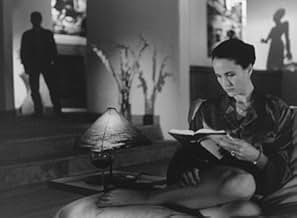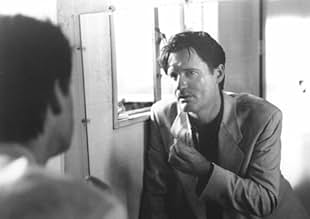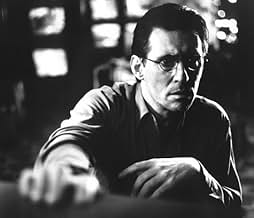AVALIAÇÃO DA IMDb
5,6/10
5,4 mil
SUA AVALIAÇÃO
Adicionar um enredo no seu idiomaMike is a successful Hollywood producer of violent movies. Then he himself experiences extreme violence, goes missing, joins some Latino gardeners and reviews his life.Mike is a successful Hollywood producer of violent movies. Then he himself experiences extreme violence, goes missing, joins some Latino gardeners and reviews his life.Mike is a successful Hollywood producer of violent movies. Then he himself experiences extreme violence, goes missing, joins some Latino gardeners and reviews his life.
- Prêmios
- 1 vitória e 4 indicações no total
Nicole Ari Parker
- Ade Kenya
- (as Nicole Parker)
Samuel Fuller
- Louis Bering
- (as Sam Fuller)
Avaliações em destaque
...or as I like to think of it, THE END OF VIOLENCE is the greatest scifi crime thriller that never was.
As always with Wim Wenders, the plot is fantastic. But, as always with Wim Wenders, the movie isn't about the plot, and those who expect to be carried by the plot will be disappointed. In the same way WINGS OF DESIRE had a great plot about angels but was not a fantasy; in the same way UNTIL THE END OF THE WORLD had a great plot about a high tech dream machine but was not about technology; in the same way LISBON STORY had a riveting plot about a missing person but was not a mystery, here we have the same Wendersian formula which he pulls off flawlessly.
The plot, if you're curious, is about a futuristic "God machine" that can eliminate people with the push of a button. Designed ostensibly for crime prevention & surveillance (the old "to protect & serve" - where have we heard that before?), it gets out of control and takes murder & corruption to the next level of clinical perfection. Caught up in the game is Mike Max, a movie producer struggling with his own intense xenophobia and paranoia, which, like a disease, he himself spreads to society through his films.
That's all I'll say about the plot because (a) I don't want to ruin anything, and (b) like I said, the plot is secondary. What's really important, as you watch this movie, is to pay attention to the thought-provoking dialogue, the philosophical allusions and the overall metaphor of the situation. If you can tune into that stuff, then you're set for a great experience.
I'll give you just one example of the philosophy. There's a scene early on where they talk about the "observer effect" (you might recognize it as the paradox of "Schrödinger's cat" which you can look up on wikipedia). This is the fundamental theme of the film: the idea that, even by "impartially observing", we change the situation or in some cases destroy it. As one of the characters says, it's like "flipping on the light to observe the darkness." What a poetic & appropriate analogy.
This movie is choc full of that kind of stuff, and you may miss it if you're expecting car chases and gunfire. No, instead you get the ultimate anti-violence violence film, and I gotta give Wenders a standing ovation on being the first director I've seen pull it off.
A lot of movies in the past have carried a message of anti-violence; yet the films sink to the thrill of showing violence themselves and often glorifying it (the biggest example would be Norm Jewison's classic ROLLERBALL), and this becomes confusing if not outright hypocritical. But in this case, we get a chilling depiction of the epidemic of violence without showing any blood & guts to excite our savage instincts. It remains an intellectual film, not visceral. Don't get me wrong; this movie is plenty suspenseful, and on more than one occasion it'll have your heart flopping like an electrified noodle. But it's all done by way of the mind. To me, that's what makes this depiction of violence all the more effective & frightening: the way it's so clean & neat like in a video game. And without any fuss, someone's head could just go pop.
This is the best film I've seen in a while. I'm only taking off a few points because I wished it was twice as long & had more monologues, like some of the older Wenders films. But I have to say this film sticks to its objective and delivers a perfect product.
As always with Wim Wenders, the plot is fantastic. But, as always with Wim Wenders, the movie isn't about the plot, and those who expect to be carried by the plot will be disappointed. In the same way WINGS OF DESIRE had a great plot about angels but was not a fantasy; in the same way UNTIL THE END OF THE WORLD had a great plot about a high tech dream machine but was not about technology; in the same way LISBON STORY had a riveting plot about a missing person but was not a mystery, here we have the same Wendersian formula which he pulls off flawlessly.
The plot, if you're curious, is about a futuristic "God machine" that can eliminate people with the push of a button. Designed ostensibly for crime prevention & surveillance (the old "to protect & serve" - where have we heard that before?), it gets out of control and takes murder & corruption to the next level of clinical perfection. Caught up in the game is Mike Max, a movie producer struggling with his own intense xenophobia and paranoia, which, like a disease, he himself spreads to society through his films.
That's all I'll say about the plot because (a) I don't want to ruin anything, and (b) like I said, the plot is secondary. What's really important, as you watch this movie, is to pay attention to the thought-provoking dialogue, the philosophical allusions and the overall metaphor of the situation. If you can tune into that stuff, then you're set for a great experience.
I'll give you just one example of the philosophy. There's a scene early on where they talk about the "observer effect" (you might recognize it as the paradox of "Schrödinger's cat" which you can look up on wikipedia). This is the fundamental theme of the film: the idea that, even by "impartially observing", we change the situation or in some cases destroy it. As one of the characters says, it's like "flipping on the light to observe the darkness." What a poetic & appropriate analogy.
This movie is choc full of that kind of stuff, and you may miss it if you're expecting car chases and gunfire. No, instead you get the ultimate anti-violence violence film, and I gotta give Wenders a standing ovation on being the first director I've seen pull it off.
A lot of movies in the past have carried a message of anti-violence; yet the films sink to the thrill of showing violence themselves and often glorifying it (the biggest example would be Norm Jewison's classic ROLLERBALL), and this becomes confusing if not outright hypocritical. But in this case, we get a chilling depiction of the epidemic of violence without showing any blood & guts to excite our savage instincts. It remains an intellectual film, not visceral. Don't get me wrong; this movie is plenty suspenseful, and on more than one occasion it'll have your heart flopping like an electrified noodle. But it's all done by way of the mind. To me, that's what makes this depiction of violence all the more effective & frightening: the way it's so clean & neat like in a video game. And without any fuss, someone's head could just go pop.
This is the best film I've seen in a while. I'm only taking off a few points because I wished it was twice as long & had more monologues, like some of the older Wenders films. But I have to say this film sticks to its objective and delivers a perfect product.
5=G=
"The End of Violence" is a clutter of stick figures wandering through a messy story about some sci-fi "big brother" government project being tested in Los Angeles. The film trades interesting characters for interesting situations, connects the dots too late revealing too little, and ends in a self absorbed coma about as flat as warm beer. Nonetheless, the film has a respectable cast, a garnish of neo-Beat poetry, a brooding noir feel, a good soundtrack, and some husky-voiced philosophical narration by Pullman making it a par watch for the needy couch potato. (C)
I'm not surprised that a child would not understand this movie. To me it was very meaningful, but only in terms of lived experience in jobs and politics. It's really "Brave New World," where authority figures keep order by putting up cameras everywhere and intervening to eliminate anyone who is disorderly or criminal. Violence is a huge preoccupation, but only tolerated as make-believe -- but the make-believe gets confused with real violence. Control, transgression, power are the pivots of the well-to-do. Ashcroft stuff.
But the Mexican and immigrant families offer a warmer, truer alternative. In the end, they are more powerful because they are free and can think. The Kinko's episode, in which the police are defeated from taking control by their own preconceptions, is a good example. As underlings, laborers, the Mexicans understand what's at stake and they are everywhere, invisible to their employers.
The intellectual technician doesn't catch on until it's too late.
I'm told that what I saw was a re-cut and that the early version was indeed chaotic with a lot of loose ends. All I can say is that now this is one of the videos I rewatch and ponder.
But the Mexican and immigrant families offer a warmer, truer alternative. In the end, they are more powerful because they are free and can think. The Kinko's episode, in which the police are defeated from taking control by their own preconceptions, is a good example. As underlings, laborers, the Mexicans understand what's at stake and they are everywhere, invisible to their employers.
The intellectual technician doesn't catch on until it's too late.
I'm told that what I saw was a re-cut and that the early version was indeed chaotic with a lot of loose ends. All I can say is that now this is one of the videos I rewatch and ponder.
Wim Wender's The End of Violence is a rather disjointed and uninvolving piece of film-making. It wants to be a tale about how violence affects our lives and how, once exposed to it, we find ourselves fundamentally changed. It might actually succeed if it wasn't busy confusing the audience and boring them to death at the same time.
As the film opens, we are treated to a day in the life of Hollywood producer Mike Max (Bill Pullman), who is busy wheeling and dealing through multiple phones and computer connections, all the while ignoring his wife, Paige (Andie McDowell). While he is out during the day, he is kidnapped by two not quite bright hit men who are killed in a mysterious fashion and Mike Max manages to escape. He is found dazed by some Latino gardeners and Mike decides that he needs to hide from his old life to protect himself while discovering that violence, which he has peddled in action movies, is a bad thing. Meanwhile, Paige has taken over her husbands company in his absence and developed a relationship with a recording artist named Six (K. Todd Freeman) who provides the love she was lacking in her relationship with Mike. Also meanwhile, technical whiz Ray Bering (Gabriel Byrne) is busy putting the finishing touches on a high-tech surveillance system that the government hopes to use to bring violence in the city under control. However, Ray begins to suspect that the system is possibly being used for nefarious purposes and is trying to get someone to listen to him. And yet elsewhere still, stuntwoman turned actress Cat (Traci Lind) is getting her big acting break in Mike's latest film, and she finds herself somewhat smitten with detective Dean Brock (Loren Dean) who is investigating the disappearance of Mike.
As you can probably tell from the above paragraph, The End of Violence has a lot going on. The problem is that little of it is compelling and because the film is busy juggling so many plot threads at the same time, several of them seem like afterthoughts. The subplot featuring Paige's involvement with Six, for instance, has absolutely no emotional resonance for the audience because we barely know these people. The film also takes a lot of side trips to inexplicable scenes where people gather at performance art sessions to get some bigger message across, I guess, but they just end up being pointless and drawing the film out even more.
Wenders manages to suck the life out of most of the scenes in the film. The acting is uniformly wooden and unconvincing, the characters are little more than bodies going through the motions, and the plot is half-explained and developed. Take the plot thread of Ray trying to discover the truth about the surveillance system. It is revealed eventually that he has actually already been in contact with Mike about it with the hopes of revealing the system to the public, but the film has so many pieces moving around that it takes forever to make the connection between those two characters.
The film also features dreaded voice-over monologues that are just silly and pretentious. The anti-violence message, what there is of it, is also heavy-handed, to say the least. In one scene, Six speaks to Mike on the phone and gives us a long explanation about why violence is good and people revel in it. You can practically see Wenders on his soapbox while this scene is going on.
I suppose this movie is supposed to be a thriller to some degree, but there is little that is thrilling about The End of Violence. It is a monotonous bore of a film that comes to a rather abrupt ending without really dealing with all of the issues it seems to want to explore. Instead of an end of violence, I'll take an end to this particular mess.
As the film opens, we are treated to a day in the life of Hollywood producer Mike Max (Bill Pullman), who is busy wheeling and dealing through multiple phones and computer connections, all the while ignoring his wife, Paige (Andie McDowell). While he is out during the day, he is kidnapped by two not quite bright hit men who are killed in a mysterious fashion and Mike Max manages to escape. He is found dazed by some Latino gardeners and Mike decides that he needs to hide from his old life to protect himself while discovering that violence, which he has peddled in action movies, is a bad thing. Meanwhile, Paige has taken over her husbands company in his absence and developed a relationship with a recording artist named Six (K. Todd Freeman) who provides the love she was lacking in her relationship with Mike. Also meanwhile, technical whiz Ray Bering (Gabriel Byrne) is busy putting the finishing touches on a high-tech surveillance system that the government hopes to use to bring violence in the city under control. However, Ray begins to suspect that the system is possibly being used for nefarious purposes and is trying to get someone to listen to him. And yet elsewhere still, stuntwoman turned actress Cat (Traci Lind) is getting her big acting break in Mike's latest film, and she finds herself somewhat smitten with detective Dean Brock (Loren Dean) who is investigating the disappearance of Mike.
As you can probably tell from the above paragraph, The End of Violence has a lot going on. The problem is that little of it is compelling and because the film is busy juggling so many plot threads at the same time, several of them seem like afterthoughts. The subplot featuring Paige's involvement with Six, for instance, has absolutely no emotional resonance for the audience because we barely know these people. The film also takes a lot of side trips to inexplicable scenes where people gather at performance art sessions to get some bigger message across, I guess, but they just end up being pointless and drawing the film out even more.
Wenders manages to suck the life out of most of the scenes in the film. The acting is uniformly wooden and unconvincing, the characters are little more than bodies going through the motions, and the plot is half-explained and developed. Take the plot thread of Ray trying to discover the truth about the surveillance system. It is revealed eventually that he has actually already been in contact with Mike about it with the hopes of revealing the system to the public, but the film has so many pieces moving around that it takes forever to make the connection between those two characters.
The film also features dreaded voice-over monologues that are just silly and pretentious. The anti-violence message, what there is of it, is also heavy-handed, to say the least. In one scene, Six speaks to Mike on the phone and gives us a long explanation about why violence is good and people revel in it. You can practically see Wenders on his soapbox while this scene is going on.
I suppose this movie is supposed to be a thriller to some degree, but there is little that is thrilling about The End of Violence. It is a monotonous bore of a film that comes to a rather abrupt ending without really dealing with all of the issues it seems to want to explore. Instead of an end of violence, I'll take an end to this particular mess.
A film producer who escapes death by murder and chooses to lead a simple life afterwards, a group of good Mexican gardeners, a second-rate movie actress who becomes jobless, a police officer who is not happy with the filing of his case, a Salvadoran maid whose family has been shot by death squads, a NASA employee who knows too much and his old father who doesn't want to exchange his old typewriter by a computer, a mysterious project of ending up violence in the world by putting everyone under surveillance, with all those ingredients what could a movie director have made? Surely an excellent movie. This one however is too much ambitious and produces rather poor results in comparison with that ambition. Where the contrast between dream and reality, love and greed, poetry and vulgarity could have been explored we are left with a story not bad in itself but not very deep and not especially moving.
Você sabia?
- CuriosidadesThere is a scene in the film where we see a live recreation of the painting "Nighthawks" by Edward Hopper.
- Erros de gravaçãoWhen Page is holding Mike at gunpoint she holds the gun upward with the bottom of the handle facing outward and the ammo clip is clearly missing. Yet when Mike exits through the patio door she fires the gun and shatters the glass.
Obviously there was a bullet in the chamber.
- Trilhas sonorasBailare (El Merecumbe)
Written, Performed and Produced by Raul Malo
Courtesy of MCA Records, by arrangement with Universal Music
Special Markets
Principais escolhas
Faça login para avaliar e ver a lista de recomendações personalizadas
- How long is The End of Violence?Fornecido pela Alexa
Detalhes
- Data de lançamento
- Países de origem
- Idiomas
- Também conhecido como
- The End of Violence
- Locações de filme
- Griffith Observatory, 2800 E Observatory Rd, Los Angeles, Califórnia, EUA(Multiple interior and exterior scenes; as Ray Bering's workshop. Hillside hike viewpoint just south of observarory)
- Empresas de produção
- Consulte mais créditos da empresa na IMDbPro
Bilheteria
- Orçamento
- US$ 5.000.000 (estimativa)
- Faturamento bruto nos EUA e Canadá
- US$ 386.673
- Faturamento bruto mundial
- US$ 386.673
- Tempo de duração2 horas 2 minutos
- Cor
- Mixagem de som
- Proporção
- 2.35 : 1
Contribua para esta página
Sugerir uma alteração ou adicionar conteúdo ausente






































